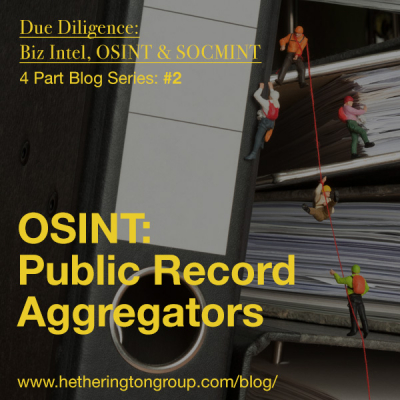 By Cynthia Hetherington
By Cynthia Hetherington
Due diligence investigations examine the backgrounds of corporate entities and the principals who manage them. They are applicable to all professionals involved in investigations, insurance and risk managers, attorneys, investigative reporters, security practitioners, and every-day consumers. Business intelligence, open source research (OSINT), and social media research (SOCMINT) are key tools that assist in researching and conducting due diligence.
Hg conducts online backgrounds on businesses, persons, and entities—foreign and domestic. In employing OSINT and SOCMINT skills, we are able to expose fraudulent business enterprises, locate assets, and gather undercover intelligence. In this 4-part series, we discuss how to use public record resources, social media resources, no-cost social media and open source monitoring, and the difference between fee and free resources, and offer two case studies. This week we tackle public record resources for conducting a due diligence investigation.
Public Record Resources
For efficiency, tools commonly associated with intelligence and open source research are aggregation services. Aggregators pull together most of the public records and information on a topic and make it accessible, searchable, and easy to incorporate into your reports.
Federal laws, including the Fair Credit Reporting Act, the Gramm-Leach-Bliley Act, and the Driver’s Protection Privacy Act govern how personal information, i.e., social security numbers and dates of birth, is gathered and shared. Such personal data is used legally for the purpose of examining for fraud, researching a litigant, criminal investigations, and credit applications. Professional public record aggregators in the United States include Thomson Reuters CLEAR, LexisNexis Accurint, Transunion TLO, Tracers, Microbilt, idiCORE, and Delvepoint. Though the specialized professional aggregators are retrieving content from the same sources—that is, public records—each has a strength and weakness which should be considered when shopping for a service from this market.
Deciding to subscribe and pay for a fee-based aggregator is a professional choice that starts you on your business intelligence and open source searching. Consider that there are strengths and weaknesses for each provider and, if possible, subscribe to at least two in order to cover as many aspects as possible. Review the products with these issues in mind:
- Currency of data: For the data you need most, find out if the service is a live feed, updated hourly, daily, weekly, or otherwise.
- Relevancy of data: Some aggregators have very strong motor vehicle records and weak UCC’s. Purchase based on your need for the most relevant data.
- Ease of use: You should be able to plug and play your searches.
- Customer Service: As paid services, you should have help when you call.
- Price: You are paying for convenience to pull the data together quickly and make it easier to search.
Cynthia’s Tip
Outside the United States, public records and public information are governed differently. Internationally, public record information is more protected than it is in the U.S., and privacy laws restrict the use, publication, storage, and dissemination of these records. Take, for example, China. Privacy rules and regulations in China are murky, leaving a due diligence investigator at risk when conducting what is considered standard due diligence in most other countries. The high-profile arrests of Peter Humphrey and his wife Yu Yingzeng in 2013 for gathering private personal data on subjects in a due diligence case in China was a wake-up call as to the difficulties in accessing and obtaining information that provides potential investors with sound decision-making capabilities. Humphrey and Yingzeng were sentenced to approximately 2 years in prison and were released and deported after serving 7 months.
To be safe, an analyst should research data aggregators on a country by country basis to meet the needs of the due diligence investigation. It is possible to access such data in a foreign country, depending on a country’s laws, but in short, nothing compares to the United States and its vendors such as LexisNexis and Thomson Reuters for getting addresses, telephone numbers, and other key data.
Researching via Google (“public records * COUNTRY”) will develop some leads to meet your needs in that country. Do trust a .gov website over a .com website for government information. Commercial entities can and will do a good job with public records, but if you are unsure if the source information is developed and sold by the country itself, look for the government body to ascertain you are not buying fraudulent, fabricated, or stolen data.
Public Record Free Resources
Putting the aggregator databases to the side, a lot of information can still be gained with search engines (such as Google) and open source sites (such as BRB Publications). If you Google your name, you should not be surprised to come across unprotected data such as your address, telephone number, friends list, or even mentions of your approaching birthdate. BRB Publications books and digital offerings provide access to data from 28,000 government agencies, including 5,800 accredited post-secondary schools, and 3,500 record vendors. Free and easy to use, it is an open source investigative researcher’s treasure trove of information.
Beyond BRB Publications, you can search for public record sources using the following example: Search in Google for “Maine Secretary of State” and find among the returned search results www.maine.gov/sos. Free resources are plentiful but should be vetted for their value. Always choose .gov sites over .com to stay as close to the actual public record versus a resold version of it, which may be dated or unvetted.

Are you an analyst or investigator looking for advanced OSINT/SOCMINT training on due diligence? If so, check out Hg’s webinar series, where you can attend live sessions and receive CEUs or watch previously recorded sessions to beef up your investigative skills.

Are you interested in working with a company but unsure if it’s legitimate? As veteran investigators in due diligence, Hg understands the business world and the legal and regulatory frameworks in which corporations and privately held companies operate. Our skilled analysts excel at exposing financial risks, reputational issues, criminal activity, and legal actions detrimental to your personal and business stability. Learn how our team can arm you with the data you need.
 Cynthia Hetherington, MLS, MSM, CFE, CII is the founder and president of Hetherington Group, a consulting, publishing, and training firm that leads in due diligence, corporate intelligence, and cyber investigations by keeping pace with the latest security threats and assessments. She has authored three books on how to conduct investigations, is the publisher of the newsletter, Data2know: Internet and Online Intelligence, and annually trains thousands of investigators, security professionals, attorneys, accountants, auditors, military intelligence professionals, and federal, state, and local agencies on best practices in the public and private sectors.
Cynthia Hetherington, MLS, MSM, CFE, CII is the founder and president of Hetherington Group, a consulting, publishing, and training firm that leads in due diligence, corporate intelligence, and cyber investigations by keeping pace with the latest security threats and assessments. She has authored three books on how to conduct investigations, is the publisher of the newsletter, Data2know: Internet and Online Intelligence, and annually trains thousands of investigators, security professionals, attorneys, accountants, auditors, military intelligence professionals, and federal, state, and local agencies on best practices in the public and private sectors.



